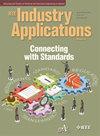Cause of Arcing Inside a Medium-Voltage Arc-Resistant Metal-Clad Switchgear Compartment on a Sunny Day Without Any Evidence of Switching Surge: Recommendations for avoiding future incidents
IF 0.7
4区 工程技术
Q4 ENGINEERING, ELECTRICAL & ELECTRONIC
引用次数: 0
Abstract
This article describes the cause of an arc fault in the cable compartment of a medium-voltage arc-resistant metal-clad switchgear (MV ARMCS) integrated inside an outdoor enclosure. The manufacturer of the outdoor enclosure for the switchgear was not the manufacturer of the arc-resistant switchgear. The arc fault occurred when there was no operator inside the switchgear to initiate the fault. The arc fault on a sunny day occurred without any evidence of a power system switching surge and without maintenance personnel touching the switchgear. The issue of missing hinged flaps is discussed in this article. An analysis of fault recordings captured by the digital protection package establishes that the arcing fault generated arc fumes with pressure that were exhausted automatically by the arc exhaust chamber assembly out of the switchgear through a wall-mounted louver. After the arc fault incident, the maintenance crew along with technical staff noted that cable insulation damage occurred due to outside moist corrosive air entering the cable compartment. Every time the wall-mounted louver opened and closed with a wind draft, air would become trapped and reach the cable compartment. Without a hinged flap at the top of the cable compartment, moist corrosive air degraded the cable insulation, causing the arc. This article provides recommendations and conclusions to avoid such incidents in the future in arc-resistant switchgears.中压抗电弧金属铠装开关设备隔间在晴天无任何开关浪涌迹象的情况下发生电弧的原因:避免未来事故的建议
本文介绍了集成在户外外壳内的中压耐电弧金属铠装开关设备(MV ARMCS)的电缆室发生电弧故障的原因。开关设备户外外壳的制造商并非耐电弧开关设备的制造商。故障电弧发生时,开关柜内没有启动故障的操作人员。故障电弧发生在一个晴朗的日子,没有任何电力系统开关浪涌的迹象,维修人员也没有接触开关设备。本文将讨论缺失铰链挡板的问题。通过对数字保护软件包采集的故障记录进行分析,可以确定电弧故障产生了带压力的电弧烟雾,这些烟雾由电弧排出室组件自动排出开关柜,并通过安装在墙壁上的百叶窗排出。故障电弧发生后,维护人员和技术人员注意到,由于外部潮湿腐蚀性空气进入电缆舱,导致电缆绝缘受损。每当壁装百叶窗在风的作用下打开或关闭时,空气就会滞留并进入电缆舱。由于电缆舱顶部没有铰链挡板,潮湿的腐蚀性空气导致电缆绝缘降解,从而引发电弧。本文提出了一些建议和结论,以避免今后在耐电弧开关柜中发生此类事故。
本文章由计算机程序翻译,如有差异,请以英文原文为准。
求助全文
约1分钟内获得全文
求助全文
来源期刊

IEEE Industry Applications Magazine
工程技术-工程:电子与电气
CiteScore
1.60
自引率
0.00%
发文量
133
审稿时长
>12 weeks
期刊介绍:
The IEEE Industry Applications Magazine publishes articles concerning technical subjects and professional activities that are within the Scope of the IEEE Industry Applications Society (IAS) and are of interest to society members. The information includes but is not limited to articles, product reviews, book reviews, new standards, education information, announcements of conferences, workshops, new publications, committee meetings, and reports of lASactivities. The Magazine communicates Executive Board actions to IAS members as required by the IAS Constitution and By-Laws.
 求助内容:
求助内容: 应助结果提醒方式:
应助结果提醒方式:


